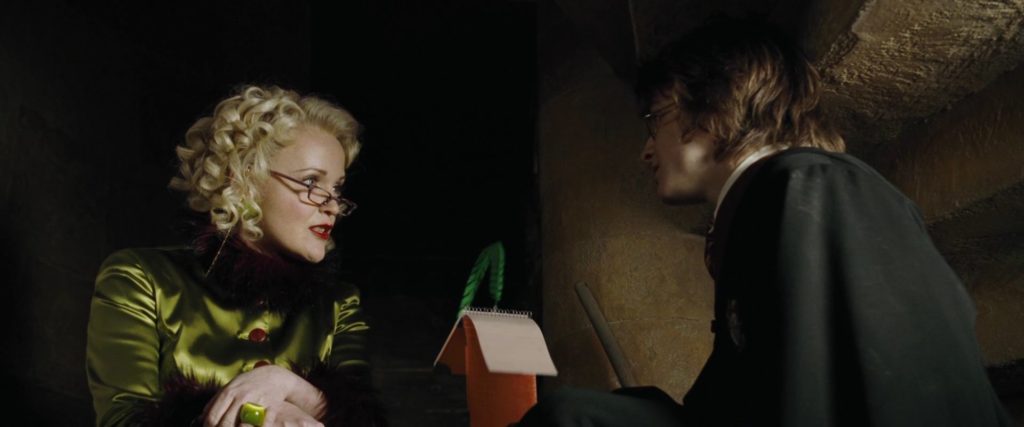Why Are Wizards So Gullible?
The Daily Prophet, which seemingly has a monopoly on news in the wizarding world, permeates the spectrum of discourse within that community. This places witches and wizards, particularly those of a pure-blooded disposition, in a precarious predicament when it comes to being misinformed about issues relevant to them. The articles featured in the Prophet are nationalistic in tone and indicative of the Ministry of Magic’s stance toward Muggle–wizard relations (during the time the Harry Potter series is set, at least). For instance, an article titled “BLACK STILL AT LARGE,” written after Sirius Black escaped from Azkaban, suggests that wizards prefer to remain isolated from Muggles, claiming that “Fudge [had] been criticized by some members of the International Federation of Warlocks for informing the Muggle Prime Minister of the crisis” (PoA 3). The article also describes guns as “metal wands,” showcasing how ignorant wizards are when it comes to Muggle technology.
Although referenced sparingly throughout the first few Harry Potter novels, the Daily Prophet took a more prominent role in the series from Harry Potter and the Goblet of Fire onward. Rowling used the Prophet as a plot device and also a means of satirizing our own mass media. Rita Skeeter’s slanderous, tabloid-style articles in Goblet of Fire laid the foundations for the Ministry to run a campaign to turn the wizarding community against Harry and Dumbledore in Harry Potter and the Order of the Phoenix. The name of the newspaper, the Daily Prophet, is a not-so-subtle condemnation against publications such as the Daily Mail. Indeed, the Mail makes a singular appearance in the third chapter of Goblet of Fire, with Uncle Vernon reading it during breakfast.
In the real world, we’re not immune to sensationalism either, but the way that the wizarding world’s relationship with the Daily Prophet is portrayed makes me wonder, why are wizards so gullible?
There appears to be no fact checking or accountability with regard to the articles that appear in the Prophet, and its journalists seemingly publish whatever they want (or at least, what the Ministry wants the Prophet to). This is highly problematic because, as I said above, the Prophet seems to have no competition at all. There aren’t any respected alternative sources, with Witch Weekly and the Quibbler being seen as a bit of a joke by wizards. Since wizards are informationally bubbled and shut off from the Muggle world, all this does is to confirm and reinforce their personal and collective biases. To compound this problem, children raised in the wizarding world are homeschooled, meaning they’re likely to have a more sheltered upbringing. Further, Hogwarts isn’t shown to put much emphasis on critical thinking (especially from the way History of Magic is taught).
With all that said, there are moments throughout the books that frustrate me to no end. Two moments that spring to mind is Molly responding to Rita Skeeter’s article in Witch Weekly, “Harry Potter’s Secret Heartache,” by sending Hermione a considerably tinier Easter egg than Harry and Ron’s dragon-sized ones and Seamus’s altercation with Harry on the first night back at Hogwarts. Firstly, although Molly tends to be overprotective toward Harry, she also described Rita as “wretched” (GoF 10), so it’s rather contradictory that she would be partial to an article written by her. Also, granted that she does not know Hermione that well, she’s still spent enough time interacting with her to know that what Rita wrote about her was implausible. Secondly, Seamus is shown to believe the Daily Prophet‘s scathing characterization of Harry as a liar, despite having shared a dorm and had classes with Harry for the past four years.
The Prophet also ran a successful smear campaign against Dumbledore, which is mind-boggling to me. In the space of less than a year, Fudge manages to convince a lot of people that Dumbledore has gone senile and is “losing his marbles” (OotP 11). Although Fudge achieves this partly by threatening the jobs of any Ministry employees suspected to be in league with Dumbledore, there’s still a proportion of people who don’t work at the Ministry. It’s astonishing that people’s opinion of Dumbledore would change so drastically because of what was written in the Prophet, considering what a well-respected figure he had been for many years.


